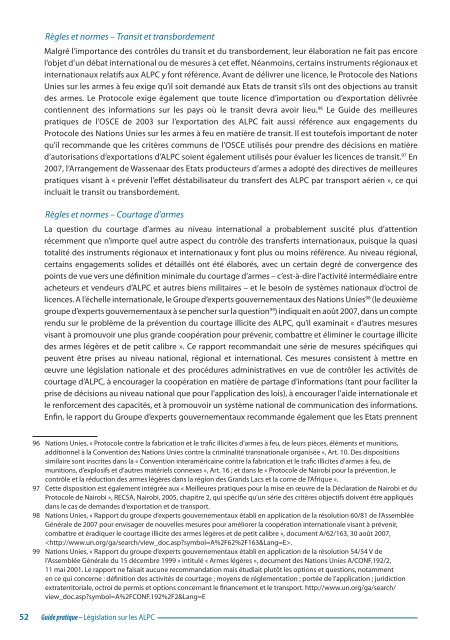Législation sur les armes légères et de petit calibre - PoA-ISS
Législation sur les armes légères et de petit calibre - PoA-ISS
Législation sur les armes légères et de petit calibre - PoA-ISS
You also want an ePaper? Increase the reach of your titles
YUMPU automatically turns print PDFs into web optimized ePapers that Google loves.
Règ<strong>les</strong> <strong>et</strong> normes – Transit <strong>et</strong> transbor<strong>de</strong>ment<br />
Malgré l’importance <strong>de</strong>s contrô<strong>les</strong> du transit <strong>et</strong> du transbor<strong>de</strong>ment, leur élaboration ne fait pas encore<br />
l’obj<strong>et</strong> d’un débat international ou <strong>de</strong> me<strong>sur</strong>es à c<strong>et</strong> eff<strong>et</strong>. Néanmoins, certains instruments régionaux <strong>et</strong><br />
internationaux relatifs aux ALPC y font référence. Avant <strong>de</strong> délivrer une licence, le Protocole <strong>de</strong>s Nations<br />
Unies <strong>sur</strong> <strong>les</strong> <strong>armes</strong> à feu exige qu’il soit <strong>de</strong>mandé aux Etats <strong>de</strong> transit s’ils ont <strong>de</strong>s objections au transit<br />
<strong>de</strong>s <strong>armes</strong>. Le Protocole exige également que toute licence d’importation ou d’exportation délivrée<br />
contiennent <strong>de</strong>s informations <strong>sur</strong> <strong>les</strong> pays où le transit <strong>de</strong>vra avoir lieu. 96 Le Gui<strong>de</strong> <strong>de</strong>s meilleures<br />
pratiques <strong>de</strong> l’OSCE <strong>de</strong> 2003 <strong>sur</strong> l’exportation <strong>de</strong>s ALPC fait aussi référence aux engagements du<br />
Protocole <strong>de</strong>s Nations Unies <strong>sur</strong> <strong>les</strong> <strong>armes</strong> à feu en matière <strong>de</strong> transit. Il est toutefois important <strong>de</strong> noter<br />
qu’il recomman<strong>de</strong> que <strong>les</strong> critères communs <strong>de</strong> l’OSCE utilisés pour prendre <strong>de</strong>s décisions en matière<br />
d’autorisations d’exportations d’ALPC soient également utilisés pour évaluer <strong>les</strong> licences <strong>de</strong> transit. 97 En<br />
2007, l’Arrangement <strong>de</strong> Wassenaar <strong>de</strong>s Etats producteurs d’<strong>armes</strong> a adopté <strong>de</strong>s directives <strong>de</strong> meilleures<br />
pratiques visant à « prévenir l’eff<strong>et</strong> déstabilisateur du transfert <strong>de</strong>s ALPC par transport aérien », ce qui<br />
incluait le transit ou transbor<strong>de</strong>ment.<br />
Règ<strong>les</strong> <strong>et</strong> normes – Courtage d’<strong>armes</strong><br />
La question du courtage d’<strong>armes</strong> au niveau international a probablement suscité plus d’attention<br />
récemment que n’importe quel autre aspect du contrôle <strong>de</strong>s transferts internationaux, puisque la quasi<br />
totalité <strong>de</strong>s instruments régionaux <strong>et</strong> internationaux y font plus ou moins référence. Au niveau régional,<br />
certains engagements soli<strong>de</strong>s <strong>et</strong> détaillés ont été élaborés, avec un certain <strong>de</strong>gré <strong>de</strong> convergence <strong>de</strong>s<br />
points <strong>de</strong> vue vers une définition minimale du courtage d’<strong>armes</strong> – c’est-à-dire l’activité intermédiaire entre<br />
ach<strong>et</strong>eurs <strong>et</strong> ven<strong>de</strong>urs d’ALPC <strong>et</strong> autres biens militaires – <strong>et</strong> le besoin <strong>de</strong> systèmes nationaux d’octroi <strong>de</strong><br />
licences. A l’échelle internationale, le Groupe d’experts gouvernementaux <strong>de</strong>s Nations Unies98 (le <strong>de</strong>uxième<br />
groupe d’experts gouvernementaux à se pencher <strong>sur</strong> la question99 ) indiquait en août 2007, dans un compte<br />
rendu <strong>sur</strong> le problème <strong>de</strong> la prévention du courtage illicite <strong>de</strong>s ALPC, qu’il examinait « d’autres me<strong>sur</strong>es<br />
visant à promouvoir une plus gran<strong>de</strong> coopération pour prévenir, combattre <strong>et</strong> éliminer le courtage illicite<br />
<strong>de</strong>s <strong>armes</strong> <strong>légères</strong> <strong>et</strong> <strong>de</strong> p<strong>et</strong>it <strong>calibre</strong> ». Ce rapport recommandait une série <strong>de</strong> me<strong>sur</strong>es spécifiques qui<br />
peuvent être prises au niveau national, régional <strong>et</strong> international. Ces me<strong>sur</strong>es consistent à m<strong>et</strong>tre en<br />
œuvre une législation nationale <strong>et</strong> <strong>de</strong>s procédures administratives en vue <strong>de</strong> contrôler <strong>les</strong> activités <strong>de</strong><br />
courtage d’ALPC, à encourager la coopération en matière <strong>de</strong> partage d’informations (tant pour faciliter la<br />
prise <strong>de</strong> décisions au niveau national que pour l’application <strong>de</strong>s lois), à encourager l’ai<strong>de</strong> internationale <strong>et</strong><br />
le renforcement <strong>de</strong>s capacités, <strong>et</strong> à promouvoir un système national <strong>de</strong> communication <strong>de</strong>s informations.<br />
Enfin, le rapport du Groupe d’experts gouvernementaux recomman<strong>de</strong> également que <strong>les</strong> Etats prennent<br />
96 Nations Unies, « Protocole contre la fabrication <strong>et</strong> le trafic illicites d’<strong>armes</strong> à feu, <strong>de</strong> leurs pièces, éléments <strong>et</strong> munitions,<br />
additionnel à la Convention <strong>de</strong>s Nations Unies contre la criminalité transnationale organisée », Art. 10. Des dispositions<br />
similaire sont inscrites dans la « Convention interaméricaine contre la fabrication <strong>et</strong> le trafic illicites d’<strong>armes</strong> à feu, <strong>de</strong><br />
munitions, d’explosifs <strong>et</strong> d’autres matériels connexes », Art. 16 ; <strong>et</strong> dans le « Protocole <strong>de</strong> Nairobi pour la prévention, le<br />
contrôle <strong>et</strong> la réduction <strong>de</strong>s <strong>armes</strong> <strong>légères</strong> dans la région <strong>de</strong>s Grands Lacs <strong>et</strong> la corne <strong>de</strong> l’Afrique ».<br />
97 C<strong>et</strong>te disposition est également intégrée aux « Meilleures pratiques pour la mise en œuvre <strong>de</strong> la Déclaration <strong>de</strong> Nairobi <strong>et</strong> du<br />
Protocole <strong>de</strong> Nairobi », RECSA, Nairobi, 2005, chapitre 2, qui spécifie qu’un série <strong>de</strong>s critères objectifs doivent être appliqués<br />
dans le cas <strong>de</strong> <strong>de</strong>man<strong>de</strong>s d’exportation <strong>et</strong> <strong>de</strong> transport.<br />
98 Nations Unies, « Rapport du groupe d’experts gouvernementaux établi en application <strong>de</strong> la résolution 60/81 <strong>de</strong> l’Assemblée<br />
Générale <strong>de</strong> 2007 pour envisager <strong>de</strong> nouvel<strong>les</strong> me<strong>sur</strong>es pour améliorer la coopération internationale visant à prévenir,<br />
combattre <strong>et</strong> éradiquer le courtage illicite <strong>de</strong>s <strong>armes</strong> <strong>légères</strong> <strong>et</strong> <strong>de</strong> p<strong>et</strong>it <strong>calibre</strong> », document A/62/163, 30 août 2007,<br />
.<br />
99 Nations Unies, « Rapport du groupe d’experts gouvernementaux établi en application <strong>de</strong> la résolution 54/54 V <strong>de</strong><br />
l’Assemblée Générale du 15 décembre 1999 » intitulé « Armes <strong>légères</strong> », document <strong>de</strong>s Nations Unies A/CONF.192/2,<br />
11 mai 2001. Le rapport ne faisait aucune recommandation mais étudiait plutôt <strong>les</strong> options <strong>et</strong> questions, notamment<br />
en ce qui concerne : définition <strong>de</strong>s activités <strong>de</strong> courtage ; moyens <strong>de</strong> réglementation ; portée <strong>de</strong> l’application ; juridiction<br />
extraterritoriale, octroi <strong>de</strong> permis <strong>et</strong> options concernant le financement <strong>et</strong> le transport. http://www.un.org/ga/search/<br />
view_doc.asp?symbol=A%2FCONF.192%2F2&Lang=E<br />
52 Gui<strong>de</strong> pratique – <strong>Législation</strong> <strong>sur</strong> <strong>les</strong> ALPC

















